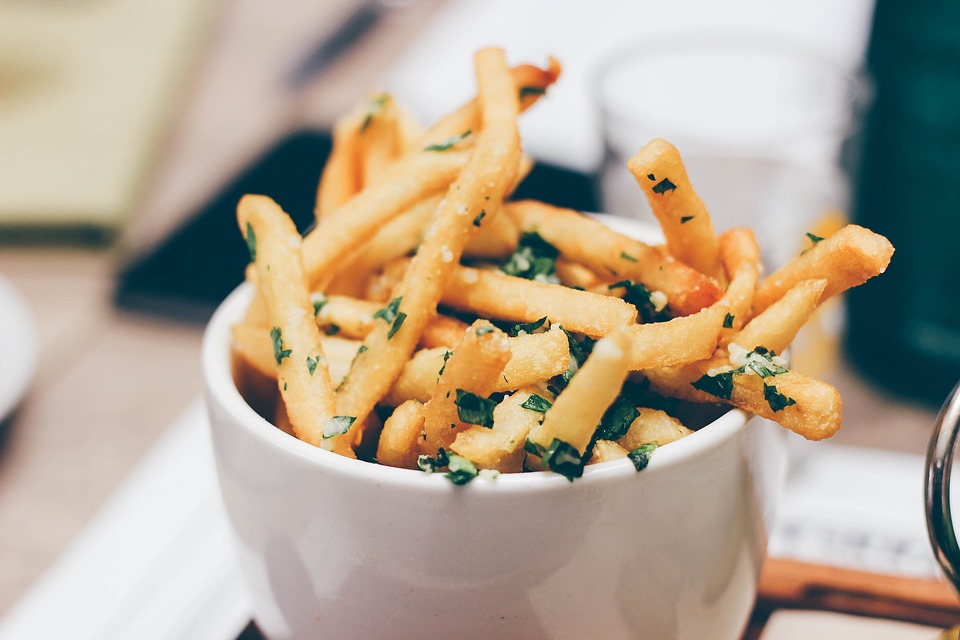To learn how to handle peer pressure while dieting, you must first understand why you’re being pressured.
Because it has nothing to do with you.
It has everything to do with “crab theory,” a real-life phenomenon where crabs, quite literally, pull each other down when trapped in a bucket and see a fellow crab attempting to escape—as if to say, ‘If I’m not escaping, neither are you.”
Without realizing it, your friends and family do the same thing (pull you down) when you’re making a sacrifice (the aforementioned “escaping”) they struggle to make. This surfaces as…
“You’re really not going to eat with us?”
“Aren’t you getting too skinny?”
“Can’t you cheat one time? Live a little!”
“You’re withering away on us!”
“Oh, come on. Just a [INSERT JUNK]!”
“Be fun for once!”
And, while these comments are rooted in insecurity and have nothing to do with us…
It IS our responsibility to handle them well.
Otherwise, we’ll succumb to their beratement, in the interest of (A) getting them off our backs, and (B) making everybody comfortable—which, not-so-shockingly, isn’t conducive to transformation goals. So let’s break down exactly how to handle peer pressure when dieting:
Step #1: Passively deflect it
For this example, we’ll pretend you’re out to dinner with extended family, and your Uncle Billy insists that you try his truffle fries. When you politely decline, he has a moment of insecurity and says, “What, does your diet not allow it?”
This is his only freebie.

You don’t owe anybody a “courtesy bite”
At this point, you have a few options for Passive Deflection:
– Playfully roll your eyes and change the subject
– Barely address it (ex. “Good one!) and change the subject
– Make a “Really?” face and change the subject
– Laugh it off and change the subject
Notice how none(!) of these examples require you to explain yourself, your goals, or your diet to Uncle Billy. You don’t owe him this information.
Step #2: Activity deflect it
Let’s pretend Uncle Billy persists after you attempt to use Passive Deflection to change the subject:
“No, really. You can’t have ONE cheat meal on your little diet?”
Here, we can be more direct with Active Deflection, and address things just enough to allow him to save face, but not so much you’re giving in to his crap:
– “Actually, I eat whatever I want—but I’m choosing this”
– “This is what I’m in in the mood for tonight”
– “I’m not hungry for the fries right now—okay?”
– “I’m saving my appetite for [INSERT HEALTHY MEAL]”
Again, it’s incredibly important to change the subject after responding. You need to make it clear it’s not a welcomed conversation.

With Active Deflection, they still get to save face at the table
Step #3: Make it uncomfortable
Unfortunately, things can escalate when the “Uncle Billy’s” of the world get testy (AKA: insecure). They might…
✕ Try to order for you
✕ Put junk on your plate*
✕ Attempt to explain why you’re “approaching it wrong”
✕ Begin insulting you (“Looks like we’re dining with Ms. Healthy tonight!”)
*Once, I had a client’s uncle stuff loaded fries into her salad, because she wouldn’t splurge with him. Behavior like this is despicable, and why I’ve written this article.
This is where I remind you: the way people treat you isn’t your fault—but it IS your responsibility. It’s time to stand up for yourself:
– “I’m not interested in discussing my plate”
– “I respect your choices and you need to respect mine”
– “I don’t appreciate your commentary and want it to stop”
– “I’m done talking about this”
Yes, this will be uncomfortable for them—but, after two “chances,” they deserve to “suffer” through discomfort, and you deserve to NOT have to tolerate it.
Step #4: Have a private conversation
As pathetic as this, I’ve had clients whose friends and family members STILL didn’t quit after the first three steps were followed. This is where an additional steps becomes necessary.

You might need to make a call to solve the problem
A day or two after the meal, pull aside “Uncle Billy,” or give him a call, saying…
“Billy, I’d like to talk to you about something. I’m working on improving my health,* and it’s very hard to stick to my plan when you’re giving me a hard time like you did the other night.”
And as my uncle,** I know you want what’s best for me—but this IS what’s best… so I’d appreciate your support here. Can I count on you next time?”
*You do NOT owe anyone specifics beyond this.
**Or brother, friend, cousin, etc.
When you (A) highlight somebody’s best character traits (ex. supportiveness), and (B) ask for help, they’ll get a confidence boost and want to fill those shoes for you.
———
In some cases, despite wanting to follow these steps for resisting peer pressure while dieting, you’ll face some obstacles:
Obstacle #1: Being too nervous to speak up
Look, I get it.
Speaking up to a friend or family member is intimidating, and you don’t want to make anyone feel bad. But their insecurities are NOT your responsibility to handle—and if you don’t speak up, you might face an uphill battle every time you socialize with them.

Don’t worry: you can text them if your anxiety is holding you back
This said, if your in-the-moment anxiety is intense, you can rearrange the steps, and text someone prior to the meal, asking for support:
“As a heads up, I’ve been making some changes to get healthier—so I may not participate in [INSERT JUNK HERE] tonight. Can you please have my back (as you always do) when we get there?”
Again, this person will feel complimented and want to step up—and you’re spared a face-to-face interaction.
Obstacle #2: An aggressive “Uncle Billy”
Like I said, I’ve had a client’s uncle stuff loaded fries into her salad when she turned his offer down. If you’re dealing with someone this rude and boisterous, there’s no way around it: you need to limit social interactions with them.
Your alternative is repeating Step #4 a few times and hoping they come around (which is rarely effective for people like this).
Obstacle #3: Underlying deprivation
If all it takes is a single, non-aggressive comment (ex. “Will you split ice cream with me?”) to get you to splurge… YOU might be “the problem.” Oftentimes, this is rooted in deprivation, and you’re looking for any green light to give yourself permission to splurge.

When I notice this with clients, I don’t shame them for it, or aimlessly insist they “remain disciplined.” I do the opposite and encourage enough splurges to make splurges less of a big deal, or sought after.
This non-restrictive approach works quite well:
You can learn more about the Hercules Performance Method, and how I help clients navigate nutritional obstacles (like peer pressure) HERE.
In the meantime, a brief recap of how to handle peer pressure while dieting:
1) Utilize Passive Deflection
2) Utilize Active Deflection
3) Make it uncomfortable
4) Have a private conversation
If you do this, you’ll deal with fewer “crabs,” and have an easier time staying the course. Give it a shot and let me know how it goes.










